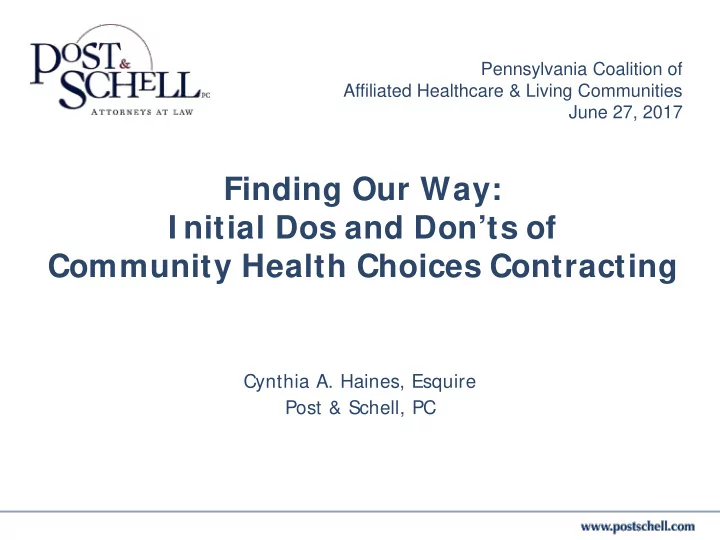

Pennsylvania Coalition of Affiliated Healthcare & Living Communities June 27, 2017 Finding Our Way: I nitial Dos and Don’ts of Community Health Choices Contracting Cynthia A. Haines, Esquire Post & Schell, PC
DHS Messages • DHS indicated that they are on target for roll out beginning January 2018 • Priorities are: No interruption in participant services No interruption in provider payment 2
DHS Messages • 20 events in the SW for CHC • Provider Education Summit on the SW July 24- 26 • If you want to be involved, contact the chosen MCOs www.dhs.pa.gov/citizens/communityhealthchoices/ 3
Before The Contract • Develop relationships • Do: Reach out to the MCOs Find the right internal representative Arm the negotiator with all the necessary information • Don’t: Be an ostrich 4
Before The Contract • Do: Be prepared Know your market Understand the provider network Document costs Demonstrate your value • Don’t: Passively wait to be told what the MCO wants 5
Before The Contract • Do: Pick Your Battles What are your most important issues? What are your deal breakers? • Don’t: Bring a 20 issue laundry list 6
Down To Business • Do: Read incorporated materials carefully Look for “incorporated by reference,” “you will be required to comply with” . . . Beware of references to other documents outside of the contract (or online) that may change without notice • Don’t: Fail to read reference material 7
Down to Business • Do: Familiarize yourself with the Provider Manual/Handbook Identify how it is changed by the MCO Consider whether you will have any input or the ability to object • Don’t: Fail to review the Provider Manual 8
Down To Business Understanding Critical Terms • Do: Read the Definitions section Realize that how terms are defined affects the entire agreement Raise concerns about inaccurate terms • Don’t: Assume the MCO has all of the terms correct. They may be new to PA or to long term care 9
Key Terms Quality • Quality is critical as more MA beneficiaries move to managed care • CMS reported that MA managed care has doubled from 2006-2015 • DHS is requiring the MCOs to achieve goals for access, quality and cost • PA has flexibility and passes that flexibility to the MCOs • MCOs pass these developing program requirements to the provider 10
Key Terms Quality • Do: Be nimble – the programs are changing Consider the client benefits for the long term care high-risk populations • Don’t: Forget to assess your systems and data collection 11
Key Terms Quality • Do: Plan for the components of a quality management program which includes: Member feedback Mechanism to track receipt of services and reporting critical incidents Risk assessment and mitigation Performance measurement and reporting Quality assurance and improvement 12
Key Terms Quality • Do: Be sure your EHR system is ready Assess whether you are tracking and measuring outcomes, cost, quality, and resident satisfaction Partner effectively with other providers • Don’t: Expect status quo 13
Regulatory Compliance Do understand your regulatory responsibilities: • Expect regulatory language related to: Exclusions Privacy and confidentiality Stark and Anti-kickback Don’t: • Agree to contractual terms that: Are more strident than the actual regulation or other requirement Are not your responsibility Require you to agree to something you can’t control 14
Procedures • Do: Review your admissions and discharge procedures Compare this to what is required under the MCO proposed contract Identify the roles of you, the MCO, the supports coordinator . . . • Don’t: Wait until you are admitting or discharging a resident to discuss 15
Procedures Documentation • Do: Check what is required Ask where the templates/forms are Do think about how this documentation fits into your current business processes • Don’t: Expect uniformity across payors 16
Procedures Billing • Do: Identify how things will change Question whether there are checks and balances Understand how you will address any disputes • Don’t wait for a problem to understand the process 17
Procedures Payment • Do: Clarify important timing issues Assure that you are working from the same definitions (e.g. clean claims, prior authorizations) Assess the co-insurance, patient pays and deductibles processes, if any Assess resident impact 18
Procedures Service Coordination • Do: Identify who you are working with Understand how service coordination is addressed in the contract Facilitate a good working relationship with the service agency coordinator 19
General Contract Requirements Know who the parties are Have a clear understanding of scope and expectations Be sure you review all attachments, addenda, riders, exhibits that are referred to in the contract, including any reference to a proposal 20
General Contract Requirements • Review: Indemnity Force Majeure Governing Law Modification Notice Severability Dispute Resolution Termination 21
General Contract Requirements • Review: Exclusivity provisions Non-compete provisions Assignment clauses Non-solicitation provisions Termination provisions that state the events that could trigger the end of the contract? What your indemnification obligation is What the insurance requirements are 22
QUESTIONS? Cynthia A. Haines, Esquire Post & Schell, PC 17 North 2 nd Street, 12 th Floor Harrisburg, PA 17101 717-612-6051 chaines@postschell.com 23
Recommend
More recommend